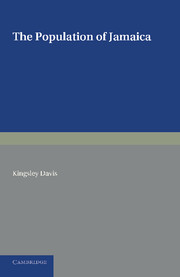Book contents
- Frontmatter
- The Conservation Foundation
- Contents
- List of Figures
- List of Tables
- Preface
- INTRODUCTION
- CHAPTER 1 DEMOGRAPHIC MATERIAL AVAILABLE
- CHAPTER 2 GROWTH OF THE POPULATION
- CHAPTER 3 MAJOR CHARACTERISTICS OF THE POPULATION
- CHAPTER 4 CURRENTS OF EXTERNAL MIGRATION
- CHAPTER 5 INTERNAL MIGRATION
- CHAPTER 6 MORTALITY
- CHAPTER 7 CHANGING PATTERNS OF REPRODUCTION
- CHAPTER 8 FERTILITY, MATING AND ILLEGITIMACY
- CHAPTER 9 GROWTH PROSPECTS
- APPENDICES
- Index of Names
- Index of Subjects
CHAPTER 4 - CURRENTS OF EXTERNAL MIGRATION
Published online by Cambridge University Press: 05 June 2016
- Frontmatter
- The Conservation Foundation
- Contents
- List of Figures
- List of Tables
- Preface
- INTRODUCTION
- CHAPTER 1 DEMOGRAPHIC MATERIAL AVAILABLE
- CHAPTER 2 GROWTH OF THE POPULATION
- CHAPTER 3 MAJOR CHARACTERISTICS OF THE POPULATION
- CHAPTER 4 CURRENTS OF EXTERNAL MIGRATION
- CHAPTER 5 INTERNAL MIGRATION
- CHAPTER 6 MORTALITY
- CHAPTER 7 CHANGING PATTERNS OF REPRODUCTION
- CHAPTER 8 FERTILITY, MATING AND ILLEGITIMACY
- CHAPTER 9 GROWTH PROSPECTS
- APPENDICES
- Index of Names
- Index of Subjects
Summary
The fact that virtually all the inhabitants of the West Indies are descendants of immigrants of one form or another or themselves immigrants is ample evidence of the importance of immigration in the development of the region. Though as we shall see in Chapter 7 immigration was by no means the only determinant of population growth that formed a part of public policy, it was certainly the most powerful in the slave regime. Post-emancipation migration, with which this chapter is concerned, was, on the other hand, very small in size, and its effects on population growth generally negligible except for a short period 1911–21. Nevertheless, these post-emancipation migrations remain of lasting historical importance and demand some treatment in any demographic analysis of the region. Three currents of post-emancipation migration can be distinguished.
The first, though of minor importance from the standpoint of its effect on population movements in the case of Jamaica, was of considerable significance for population growth in the West Indies as a whole; this was the introduction of indenture immigrants and their families from foreign territories. It is difficult to overestimate the historical importance of this movement. Indeed, Professor W. L. Burn has, with only slight overstatement, declared, ‘To write a history of immigration into the West Indies would in effect be to write the history of those colonies in the post-emancipation period.’ Indenture immigration raised countless social, economic and political problems, largely because of its close association with the changing fortunes of the West Indian sugar industry. It gave rise to a volume of legislation which went far beyond the mere regulation of the transfer of labourers and their families, extending to such fields as conditions of work, levels of wages, health standards and even the conditions of mating. The financing of these migrations posed weighty problems, the solution of which often involved protracted negotiations with the British Government. For the issue to be faced was a complex one. Not only had provisions to be made for defraying the cost of immigration; the substantial sums involved meant in fact that the financing of the movements created major problems in taxation and general fiscal policy of the territories. These assumed importance even in Jamaica, where indenture immigration was, from the numerical standpoint, of minor significance.
- Type
- Chapter
- Information
- The Population of Jamaica , pp. 101 - 141Publisher: Cambridge University PressPrint publication year: 2013



